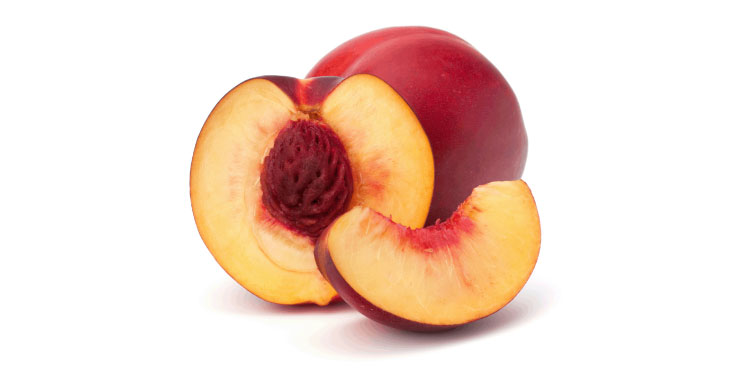The nectarine fruit is a variety of the peach tree. The botanical name of the nectarine is P. persica var. nucipersica while the botanical name of the peach is P. persica. Nectarines and peaches are similar in appearance and colour as they differ only by a single gene, the gene for skin texture. Peaches are fuzzy and dull, while nectarines are shiny and smooth. Nectarines, like peaches, probably originated in China over 2,000 years ago and were cultivated in ancient Persia, Greece and Rome. The word ‘nectarine’ means sweet as nectar, and this is very likely the obvious origin of the name.
Folate content in the fruit can help reduce the risk of neural tube defects like spina bifida and also contribute to overall health of an expectant mother and baby.
- Potassium in nectarine can help prevent muscle cramps and keep up the energy levels of mothers-to-be by building up the proteins
- The presence of dietary fibre and alkaline nature of nectarine makes it a perfect fruit for maintaining digestive health
- It promotes detoxification and prevents toxin from binding to the colon walls
- A healthy and natural source of vitamin C that can protect you from toxins and pollutants that cause illness
- It is low in calories and contains no saturated fats. A 100g of nectarine provide just 44 calories – a fulfilling desert that you can have even while you are on a diet
- Chlorogenic acid and anthocyanins present in nectarines exert inhibitory action against the oxidation of LDL cholesterol, prevent hardening of arteries and encourage proper circulation of human platelets
- Potassium in nectarine is essential for proper nerve and cellular function
- Contains chlorogenic acid, a natural compound which has multiple health benefits including prevention of various tumours and cancer such as colon cancer
- Lutein in the fruit is an important antioxidant that can help destroy free radicals
- Packed with beta-carotene – an essential nutrient that supports healthy eyes and prevents macular degeneration disease
- Vitamin A in nectarine also contributes in maintaining healthy eyesight and prevents diseases like blindness and xeropthalmia
- Vitamin A in this fruit exerts protective action against the skin damage caused by the exposure to UV radiations
















